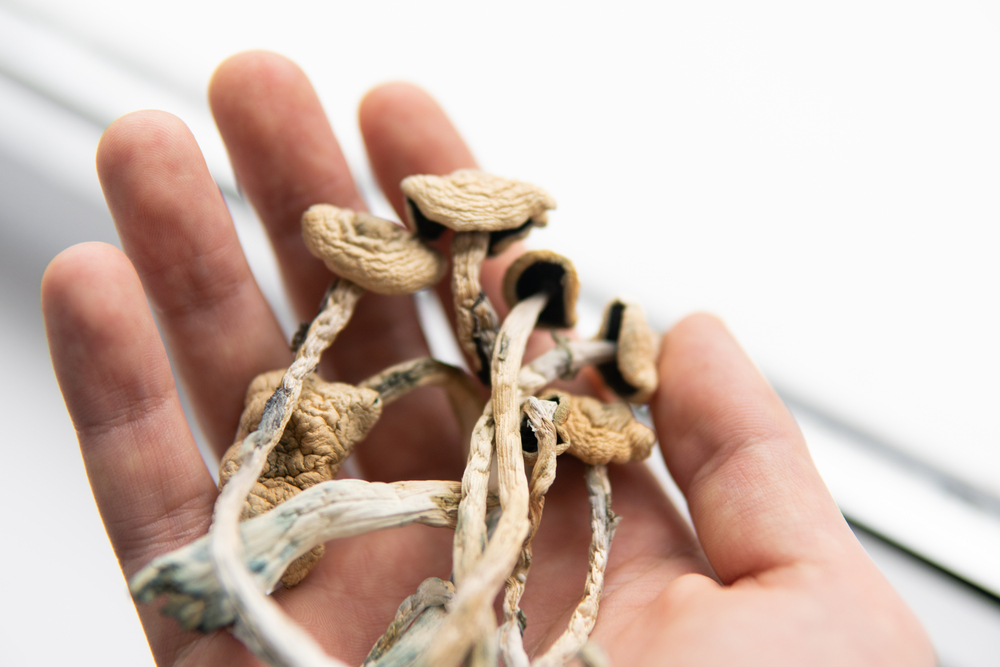The psychedelic effects of psilocybin mushrooms on depression treatment may be less potent in those currently taking or recently discontinued from certain common antidepressants, according to a recent study published in the Journal of Psychopharmacology. The study notably focuses on two categories of these medications: selective serotonin reuptake inhibitors (SSRIs) and serotonin and norepinephrine reuptake inhibitors (SNRIs). The researchers note:
“SSRI/SNRIs appear to weaken psilocybin drug effects relative to a non-serotonergic antidepressant. This dampening effect may last as long as three months following antidepressant discontinuation.”
 Psilocybin has been making waves in the mental health field due to some studies suggesting its efficacy in treating depression with just two doses, potentially providing relief for up to a year in many patients. However, since many of those who could possibly benefit from psilocybin’s depression-alleviating properties are currently prescribed antidepressants, it’s crucial to understand how these medications might interact with psilocybin.
Psilocybin has been making waves in the mental health field due to some studies suggesting its efficacy in treating depression with just two doses, potentially providing relief for up to a year in many patients. However, since many of those who could possibly benefit from psilocybin’s depression-alleviating properties are currently prescribed antidepressants, it’s crucial to understand how these medications might interact with psilocybin.
The study relied on self-reported data from an online survey, with criteria for participation including fluency in English, at least 18, and past usage of a moderate to high dose of psilocybin either while taking antidepressants or within two years of discontinuing such medications. The researchers tapped into online forums, subreddits, and other social media platforms catering to people interested in psychedelic drugs and mental health to gather the participants.
The survey was divided into two categories: those who used psilocybin while on antidepressants and those who used it within two years of discontinuing such medications. From a pool of 2,652 participants, predominantly white (91%), U.S. based (72%), slightly more male (55%), and college-educated (54%), data was gathered from 468 individuals reporting on 611 instances of psilocybin use concurrent with antidepressants.
Analysis of the survey results revealed a significant likelihood of experiencing a reduced effect from psilocybin when used in conjunction with antidepressants.
For participants taking SSRIs, there was a 47% chance of experiencing reduced effects of psilocybin. There was a 55% chance of experiencing reduced effects for those taking SNRIs. Participants taking bupropion had a 29% chance of experiencing reduced effects.
The study also involved 1,354 participants who used psilocybin within two years after stopping antidepressants. The final tally for analysis included 1,092 participants reporting on 1,542 total psilocybin experiences.
Among these, a substantial number of psilocybin experiences were reported as weaker than expected up to three months post-discontinuation of antidepressants. Approximately 32.7% of psilocybin experiences within the first week, 25.9% within the first month, and 23.3% up to three months post-discontinuation reported weaker effects.
Almost half of the participants experienced diminished effects of psilocybin when taking antidepressants concurrently. These weakened effects may persist for up to three months after discontinuing the use of antidepressants. Crucially, the study found no evidence linking the dosage or duration of SSRI/SNRI usage with the reduced effects of psilocybin.
The authors recognized several limitations to their research, such as potential inaccuracies in self-reported experiences, variance in the psilocybin content in mushrooms, and a lack of diversity in their predominantly white American sample. They concluded:
“We found evidence that psilocybin’s effects were reduced with concurrent SSRI/SNRI use more than the NDRI bupropion, and that significantly weaker than expected effects after SSRI/SNRIs may last up to 1–3 months after discontinuation even with drugs that have relatively short half-lives. Nonetheless, nearly half of the participants taking a concurrent SSRI/SNRI did not endorse reduced psilocybin effects.”
In the evolving landscape of mental health treatment, psilocybin has demonstrated potential for use in psychotherapy, treatment-resistant depression, and even substance use disorders and obsessive-compulsive disorder. However, the burgeoning field of psychedelic research isn’t without its challenges, and some scholars warn of potential adverse effects and significant validity issues that need addressing.
****
Gukasyan, N., Griffiths, R. R., Yaden, D. B., Antoine, D. G., & Nayak, S. M. (2023). Attenuation of psilocybin mushroom effects during and after SSRI/SNRI antidepressant use. Journal of Psychopharmacology, 37(7), 707–716. https://doi.org/10.1177/02698811231179910 (Link)















This is really fascinating–even for those who are skeptical of the benefits of psychedelics for relieving depression. What it points to is a core problem that may be experienced by millions of people on long-term antidepressants: the numbing of emotions. Inability to feel wonder, joy, love or curiosity may be the real problem afflicting people who struggle for years with “residual” or “treatment-resistant” depression.
But just because I am strongly inclined to believe that is what’s going on, I don’t want to assume it’s true. So I have a few questions:
First, were the researchers able to find a significant number of volunteers who had tried psilocybin without EVER having been on antidepressants? How about people who had been off them for more than two years? What did their results look like?
Second, regarding the buproprion, I’d like to know if there are any data for people taking other stimulants such as Adderall or Ritalin. Just because buproprion is labeled an “AD” (but only in the USA!) that doesn’t mean its effects are closely related.
Last but not least: Does “diminished effects of psilocybin” mean reporting less relief from depression? Or does it also mean a less vivid or emotional experience while tripping? Or maybe both? Did at least some of the subjects use psychedelics primarily for fun or adventure, rather than to seek relief from mental distress?
Report comment
Superb sharp questions.
Report comment